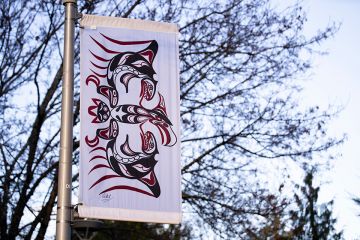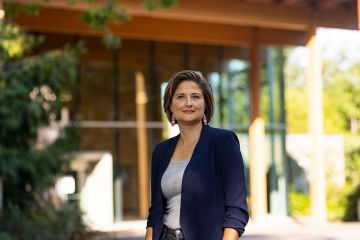Disability advocate Michael Prince named to Order of Canada
- Stephanie Harrington

Michael Prince has never worked in an ivory tower.
Over his 38 years at the University of Victoria, the acting dean of the Faculty of Human and Social Development (HSD) has built a reputation as a social and public policy expert who cares about equity issues, from child poverty and housing to veterans’ supports and disability rights.
Prince, who came to UVic in 1987 as the inaugural Lansdowne Chair in Social Policy, describes himself as an academic who also is an advocate.
"I would immediately bristle at the idea of an [academic] ivory tower,” he says. “The people I work with, the people I teach, the people I research together with, we are deeply embedded in communities.”
On December 18, Governor General Mary Simon honoured Prince’s extensive career by making him a member of the Order of Canada. One of the country’s highest honours, the Order of Canada recognizes people across all sectors of society who have made extraordinary and sustained contributions to Canada.
Prince was singled out for the significant contributions he has made to disability rights in Canada, which has included advising federal, provincial and territorial governments on disability issues and serving four Royal commissions.
“An esteemed mentor, he is highly regarded for his activism and advocacy of inclusion and accessibility,” the nomination reads.
The honour surprised Prince—he thought when he received the phone call in October that he was listed as a reference for someone else’s nomination. A wonderful part about receiving the award, Prince says, has been receiving notes from retired colleagues, former students and community members he has worked with over the years.
This is an individual honour to me, but it’s really a recognition of the journey I've been on with so many groups, so many advocates who have taught me and helped me grow. They've made me a better researcher and a better teacher.”
—Michael Prince
Prince credits his parents for instilling in him an interest in public affairs, social justice and politics. Prince’s father came from a modest background, earning a grade eight education, before serving in the Second World War. His parents emphasized the importance of education and giving back to society.
After Prince received his PhD in politics from the University of Exeter, he took up his first academic position at Carleton University. He became interested in disability issues after researching income supports, old-age pensions and veterans’ supports as a graduate student.
When he moved to BC, he was invited to author a report on the state of income support for people with disabilities for a premier’s advisory council under a Social Credit government. In the mid-90s, he became research director to a House of Commons standing committee on social security review and made connections with disability groups across Canada.
Prince has worked with nearly every party across the political spectrum and with each of the ten provinces across Canada. He has found that disability rights is an issue that affects everyone.
“What I learned early on was that disability was in many ways a non-partisan issue. It affected people’s lives no matter where you were on the political spectrum,” Prince says. "Don't write off a lot of political parties because they’re not sharing your overall values—find a common cause.”
Other high-profile positions he has held in recent years include serving two terms as the chair of Community Living BC’s board of directors. In April last year, Prince made headlines after resigning from the federal government’s Ministerial Disability Advisory Group, which he had sat on since 2020, in protest over Ottawa’s new disability benefit.
Disability advocates hoped the Canada Disability Benefit would lift up to 1.5 million people with disabilities out of poverty. But details of the new benefit showed half that number, some 600,000 people, would be eligible to receive a maximum annual benefit of $2,400 per year, or $200 per month. It fell woefully short of advocates’ hopes.
Prince says it is still a historic piece of legislation but was disappointed Canada missed a chance to make a significant difference to the lives of people with disabilities.
We're moving in the right direction, but unevenly. Like any good social cause, there’s going to be setbacks and struggles. That's why I continue to do the work—there's always a to-do list.”
—Michael Prince
After decades at UVic, Prince is retiring at the end of June. But that won’t mean the end of his work or advocacy.
Prince has been appointed as the independent monitor to track the Nova Scotia government’s progress implementing a human rights remedy in a landmark case concerning housing for people with disabilities.
The five-year plan will address the issue of community-based services, individualized funding and enhanced housing options for people with mental and physical disabilities who have historically been lodged in institutions. Prince, who is under contract with the Nova Scotia Human Rights Commission, was selected for the role by the provincial government and a disability rights coalition.
“To me, it sums up a beautiful blend of my academic career and the activism together,” he says. “It was a tremendous honour to be asked.”
Prince is also proud to be finishing his career at UVic as the last dean of HSD. He says the new Faculty of Health will go in its own direction, but there’s a strong foundation from HSD.
"I'm very confident the work people do under the HSD umbrella will continue to flourish in new ways.”
Photos
In this story
Keywords: Administrative, staff, faculty, awards, community, government, accessibility, health, human rights
People: Michael Prince





